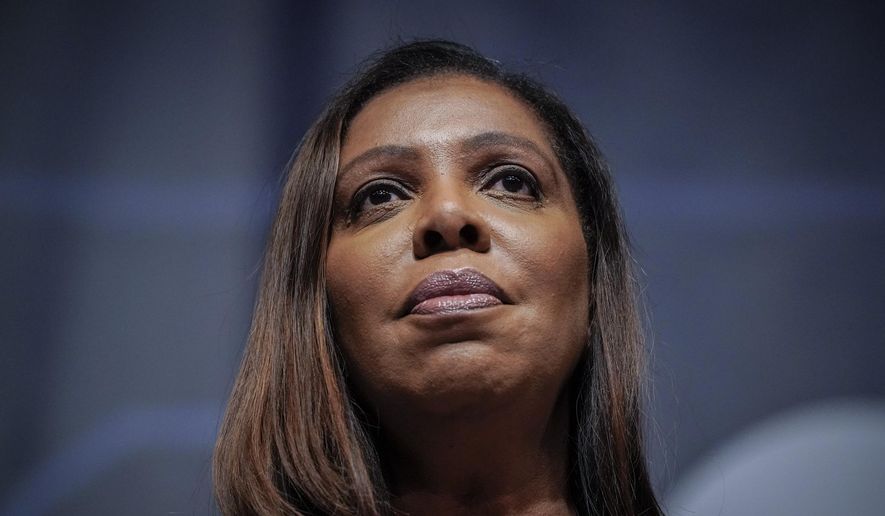NEW YORK — New York’s attorney general says a judge doesn’t need to wait until an October trial in her civil lawsuit against former President Donald Trump to rule that he committed fraud while building his real estate empire.
In court papers made public Wednesday, Attorney General Letitia James urged Judge Arthur Engoron to issue an immediate verdict endorsing her claim that Trump and his company defrauded banks and business associates by lying on financial statements about his wealth and the value of his assets.
Engoron has scheduled a Sept. 22 hearing on James’ request. Her lawsuit, which seeks $250 million in penalties and a ban on Trump doing business in New York, is scheduled to go to trial Oct. 2 in state court in Manhattan. Even if Engoron rules on the fraud claim, he would still preside over a non-jury trial on other claims in the lawsuit if it is not settled.
Messages seeking comment were left with Trump’s lawyers and a spokesperson for his company, the Trump Organization. Trump, the frontrunner for the Republican nomination in next year’s presidential election, has claimed the lawsuit is part of a “politically motivated Witch Hunt” led by James and other Democrats.
James’ lawsuit, involving allegations about Trump’s pre-presidential life as a businessman, is one of many legal headaches he faces as he seeks a return to the White House.
Trump has been indicted four times in the last five months - accused in Georgia and Washington, D.C., of plotting to overturn his 2020 election loss, in Florida of hoarding classified documents, and in Manhattan of falsifying business records related to hush money paid on his behalf. Some of Trump’s criminal trials are scheduled to overlap with the busy presidential primary season.
To rule, Engoron needs only to answer two questions, James’ office argued: whether Trump’s annual financial statements were false or misleading, and whether he and the Trump Organization used those statements while conducting business transactions.
“The answer to both questions is a resounding ‘yes’ based on the mountain of undisputed evidence” in the case, James’ special litigation counsel Andrew Amer said in a 100-page summary judgment motion.
Based on that, Amer argued, no trial is required to determine that Trump, the Trump Organization, and other defendants, “presented grossly and materially inflated asset values” in the financial statements and then used those statements “repeatedly in business transactions to defraud banks and insurers.”
“At the end of the day this is a documents case, and the documents leave no shred of doubt that Mr. Trump’s (statements of financial condition) do not even remotely reflect the ‘estimated current value’ of his assets as they would trade between well-informed market participants,” Amer wrote.
Two of Trump’s children who have worked as company executives, Donald Jr. and Eric Trump, are also named as defendants in the lawsuit, along with other high-level Trump Organization officials. Messages seeking comment were left with their lawyers.
Trump’s daughter, Ivanka Trump, was initially named as a defendant, but a state appeals court dismissed her from the case in June after determining that allegations against her were barred by the state’s statute of limitations.
James sued Trump in September 2022, alleging he and his company lied for at least a decade on annual statements of financial interest he provided to banks, insurers and others. The statements padded Trump’s net worth by billions of dollars and misled banks, insurers and others about the value of assets like golf courses, hotels and his Mar-a-Lago estate in Florida, James said. She dubbed the alleged scheme “The art of the steal,” riffing on the title of Trump’s 1987 memoir, “The Art of the Deal.”
In seeking summary judgment on the fraud claim, James’ office pointed to evidence that shows Trump inflated his net worth by up to 39%, or more than $2 billion, in some years. James’ office said Trump’s “blatant and obvious deceptive practices” included wildly overstating the size and value of his homes in Florida and New York, marking up the value of unsold condominiums and rental space, and claiming he could do more with certain land that allowed - like building more homes on his Scottish golf course that the local government had approved.
Trump answered questions in the lawsuit for seven hours at James’ office in April, a reversal from a deposition last year, before the lawsuit was filed, where he refused to answer all but a few procedural questions. At that earlier deposition, Trump invoked his Fifth Amendment protection against self-incrimination more than 400 times.
Trump is not expected to testify in court, but video recordings of Trump’s depositions could be played.




Please read our comment policy before commenting.